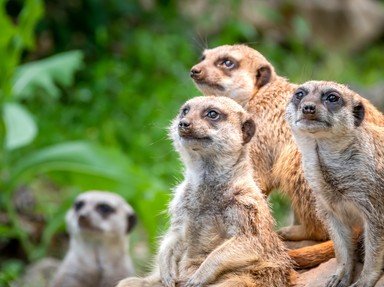Quiz Answer Key and Fun Facts
1. One seldom sees owls in bunches, but if that were to happen, what would one call a bunch of owls?
2. Shelley wrote an ode 'To A Skylark'. What is the collective term for larks?
3. I wonder if Ben Franklin knew that this was the collective noun for turkeys?
4. A goose is a goose is a goose, but what would you call a whole flock of geese?
5. One ape is an ape, two apes is a pair, but what is the word that means three or more apes?
6. Peacocks seldom stroll around in groups - except in zoos - but if they do, they're a - what?
7. A beater could tell you that when you flush pheasants, they're called this -
8. If you run across a whole bunch of bears (which is highly unlikely), you'd be looking at a what?
9. Wild geese always fly in groups (except for one or two who lose their bearings). What's the collective noun for wild geese in flight?
10. Whales are often seen in groups. What is the collective noun for a group of whales?
11. How would you properly refer to a group of swans?
12. Rabbits have which collective noun?
13. Other animals sharing a collective noun are boar and swine (probably because they are related). What's the noun?
14. One of the most descriptive collective nouns is that applied to jays. Which one of these is it?
15. A group of mice can be called a Mischief of Mice, which is pretty descriptive, but the more common collective noun is which of these?
Source: Author
Cymruambyth
This quiz was reviewed by FunTrivia editor
agony before going online.
Any errors found in FunTrivia content are routinely corrected through our feedback system.

